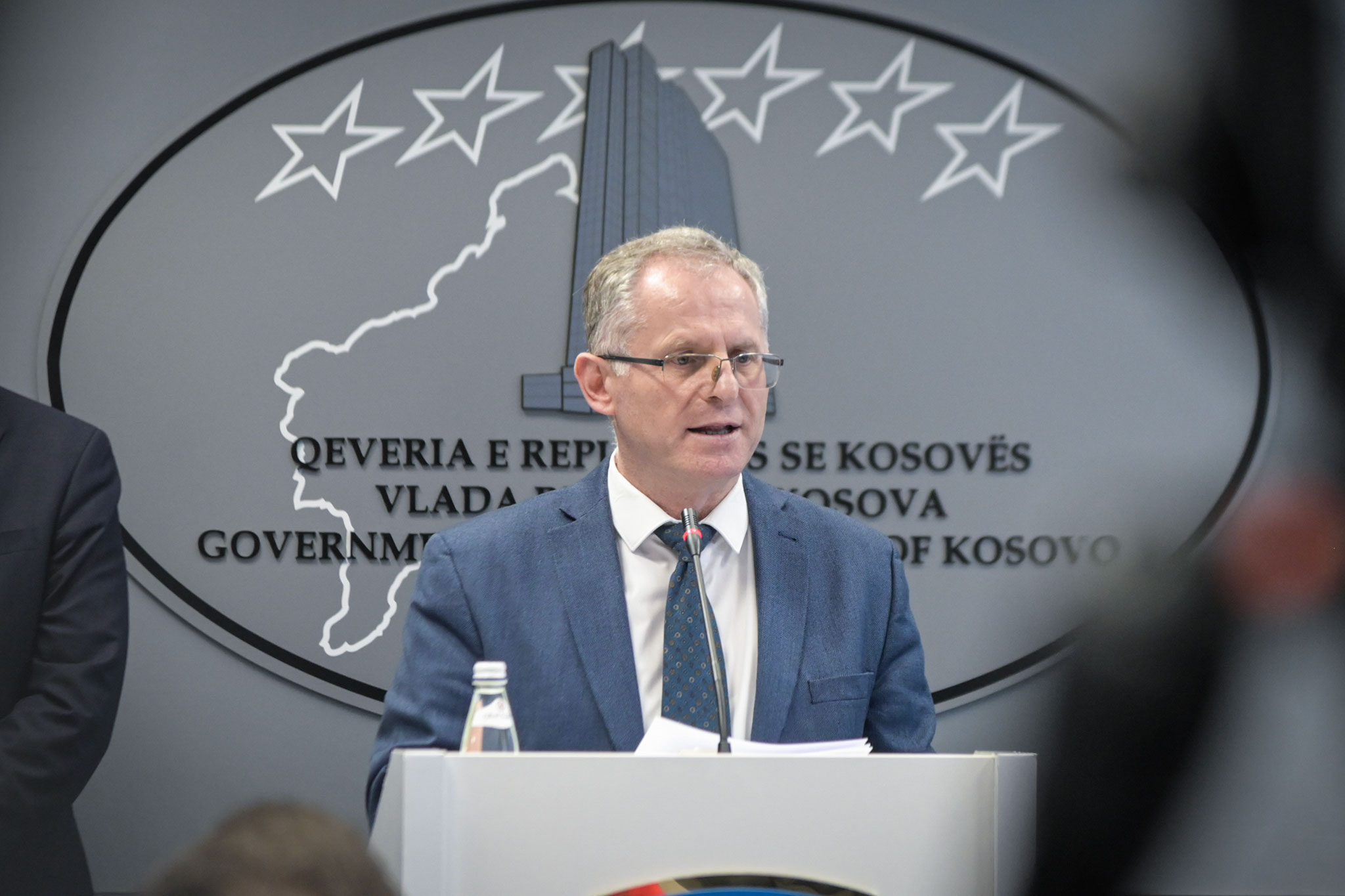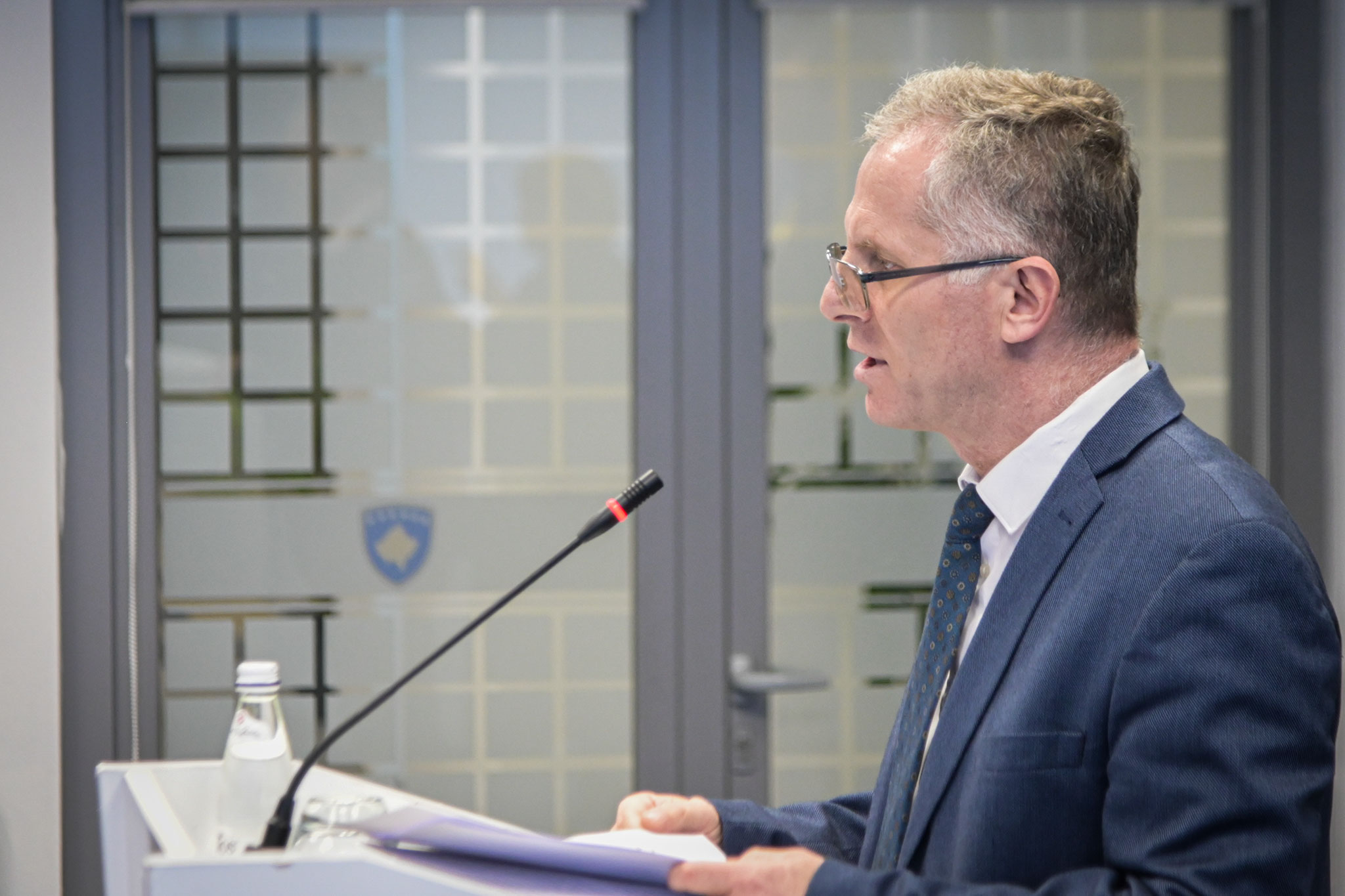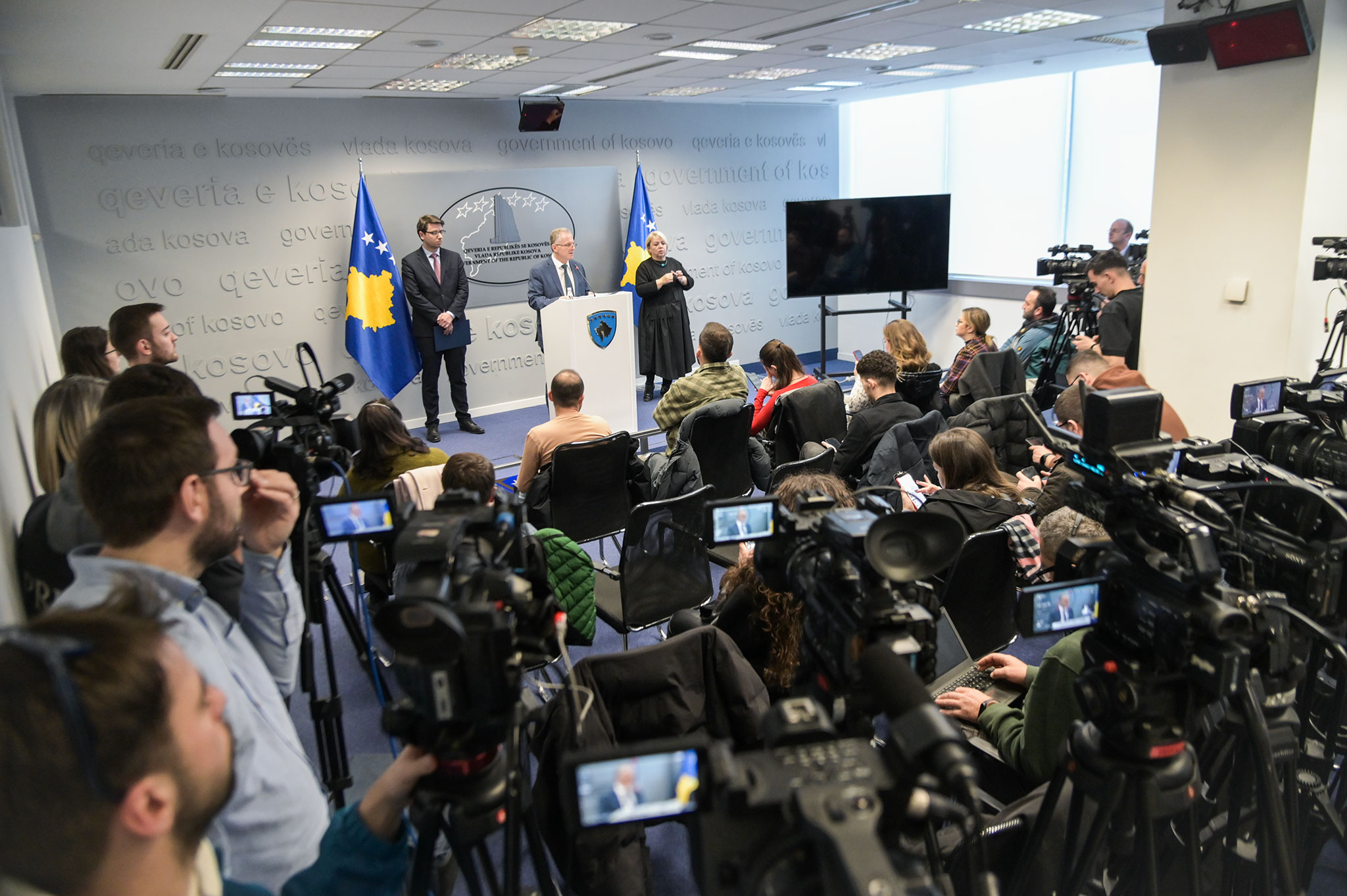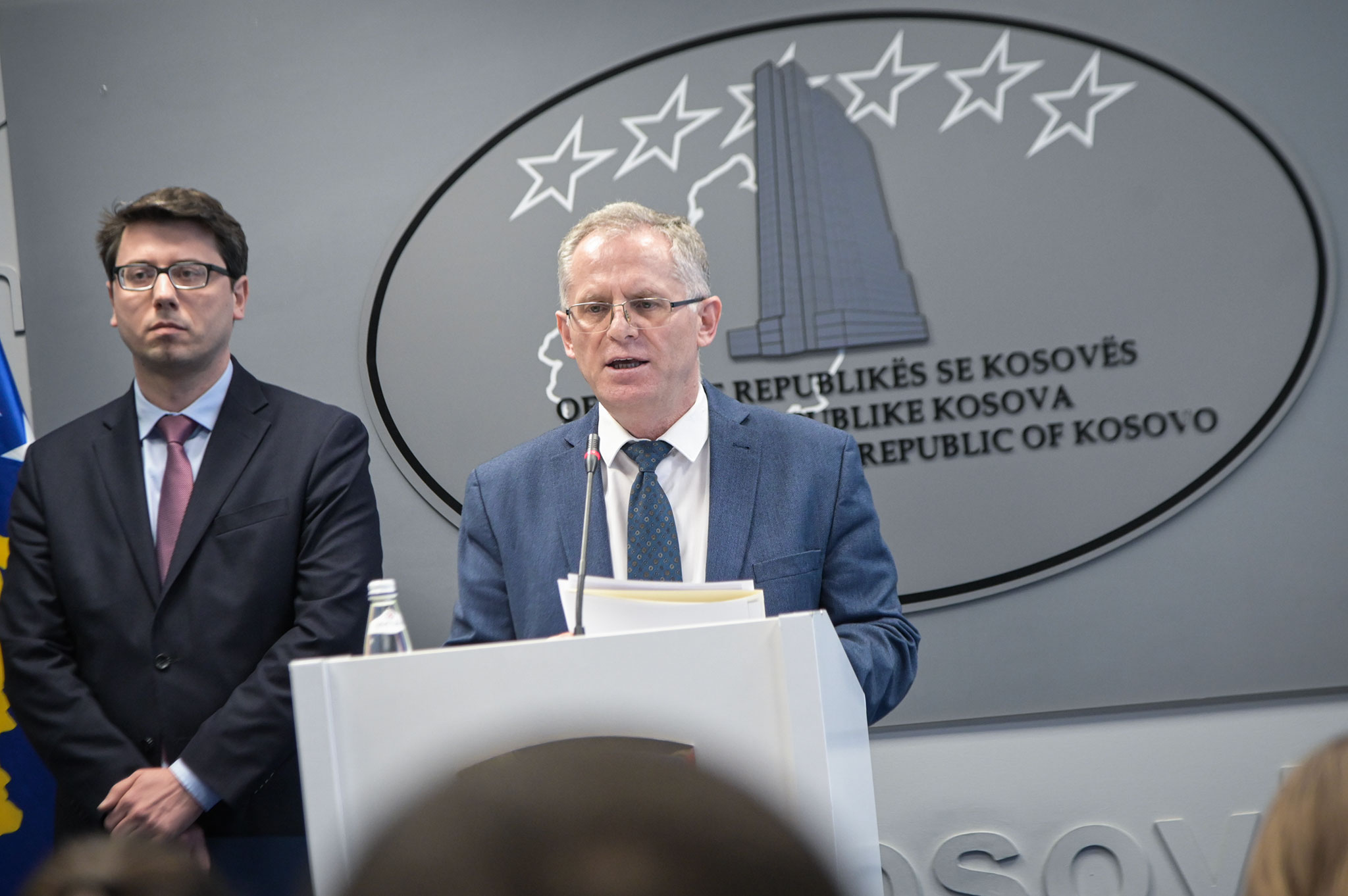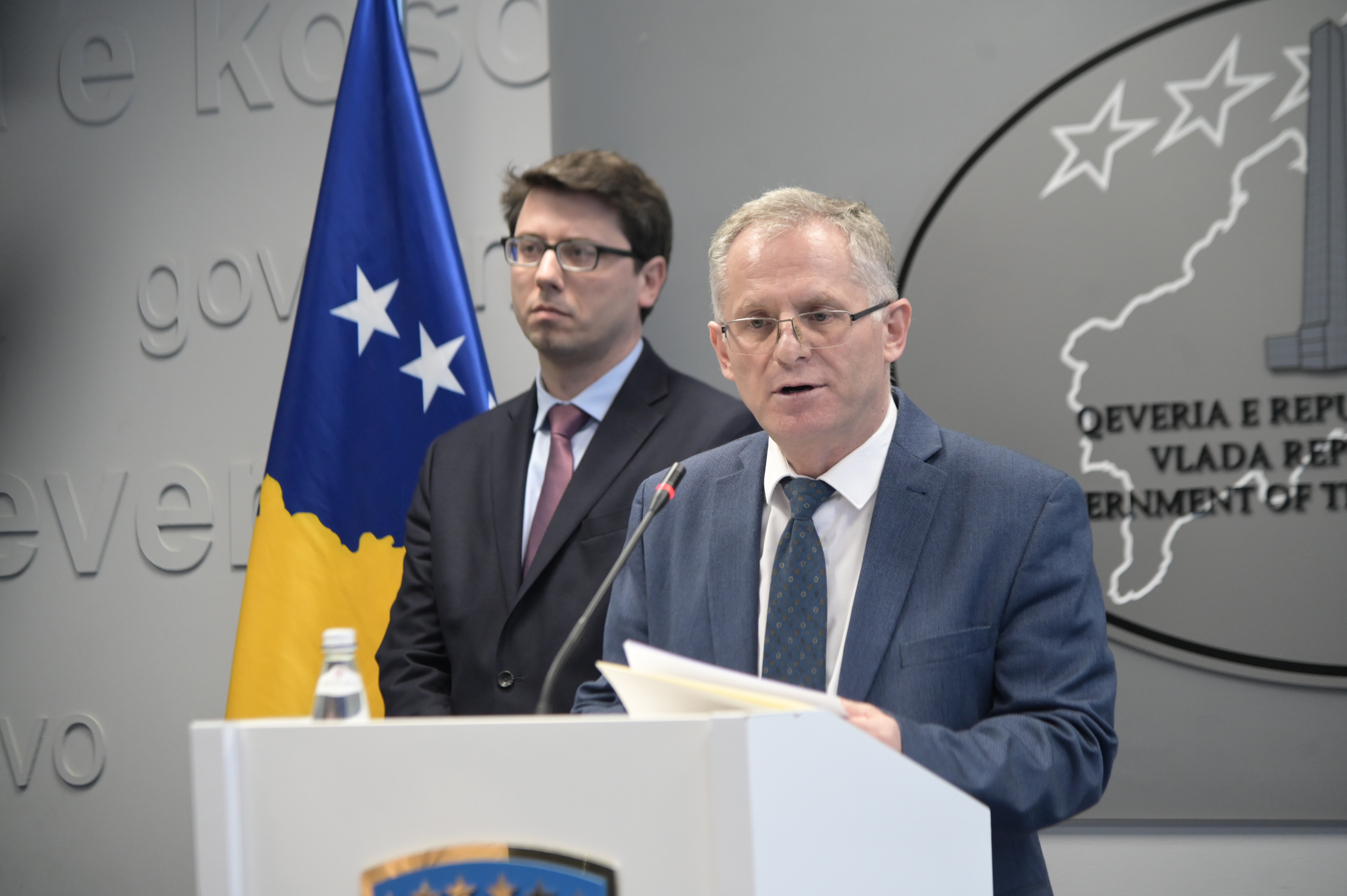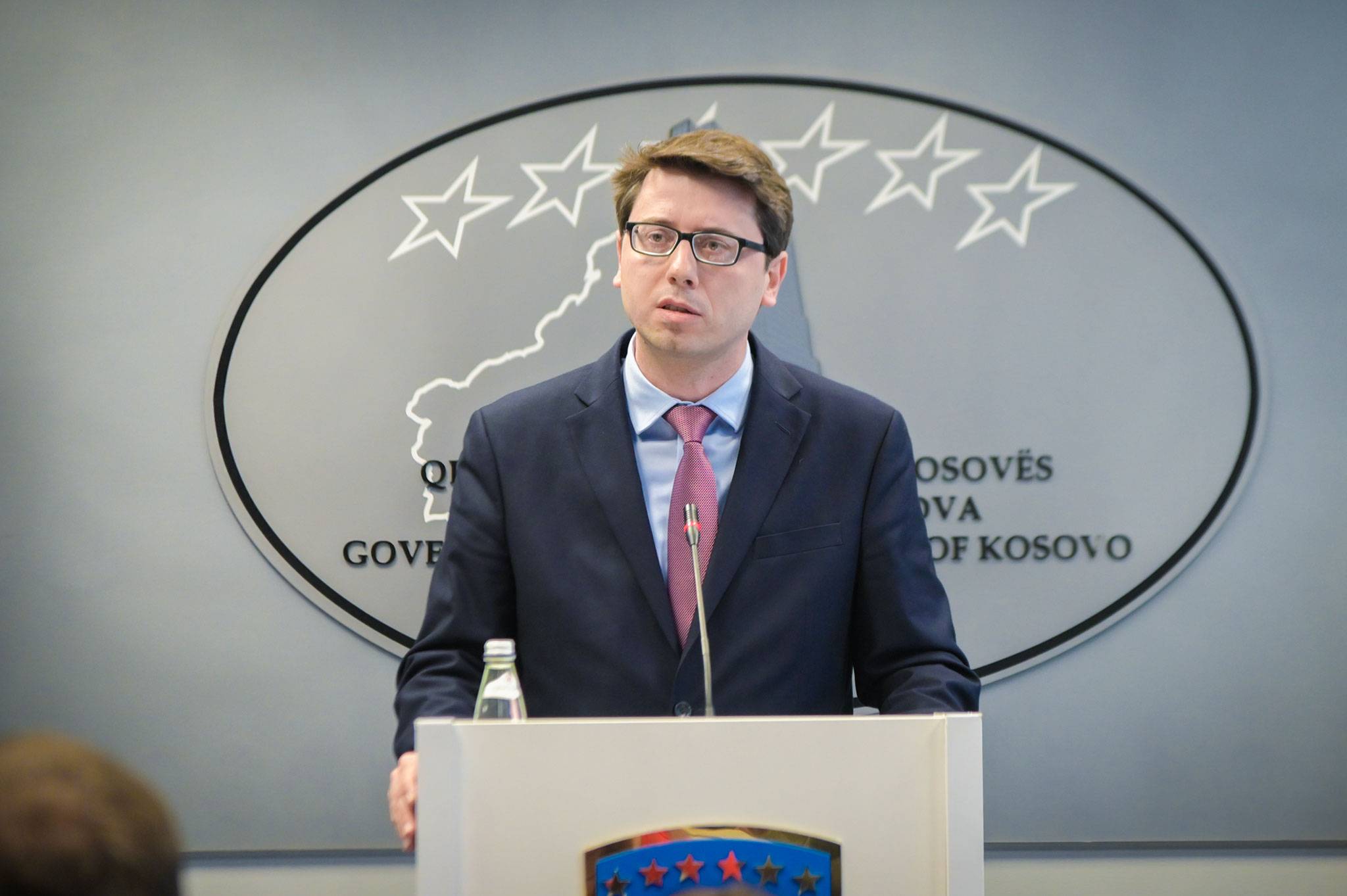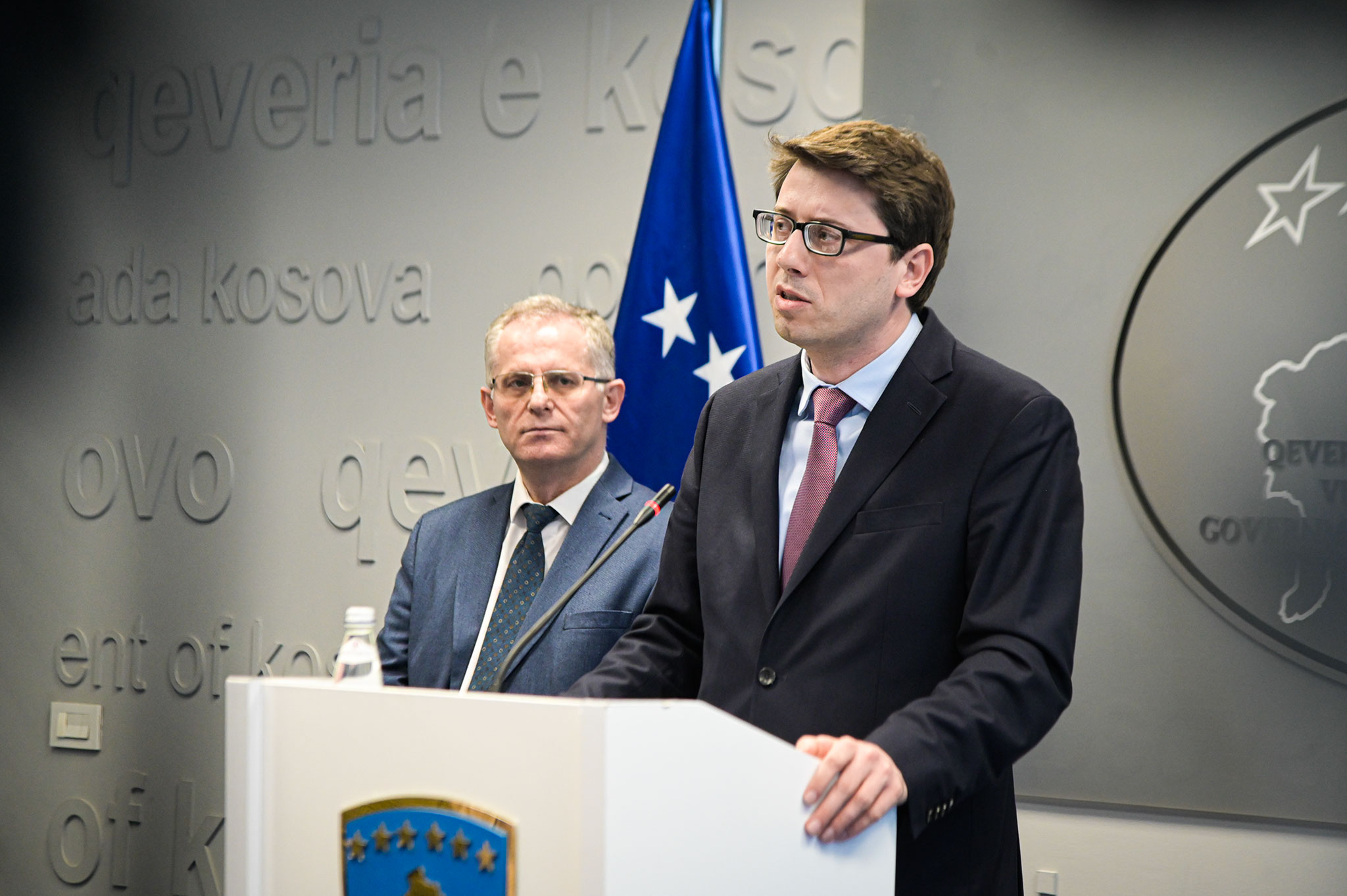Prishtina, January 31, 2024
The first Deputy Prime Minister for European Integration, Development and Dialogue of the Republic of Kosovo, Besnik Bislimi, held a media conference together with the Minister of Finance, Labor and Transfers, Hekuran Murati.
The topics addressed in this conference were the issue of the regulation approved by the Central Bank of Kosovo for cash operations and an information on last night’s meeting held with the emissary Lajçak.
Full opening speech of Deputy Prime Minister Bislimi:
Thank you for coming today to cover my press conference and that of the Minister of Finance, Mr. Murati, where we will address two topics: the issue of the regulation approved by the Central Bank of Kosovo for cash operations and an information about last night’s meeting with the EUSR, Mr. Lajcak. I will start and then Minister Murati will add elements related to the beginning of the implementation of the Central Bank regulation.
At the end of the year we left behind, the Central Bank of Kosovo approved the new Regulation for Cash Operations, which comes into force from tomorrow. As has been clarified several times by the institution that approved the regulation, it has a number of objectives: it aims to control the quantity and quality of banknotes in circulation; to protect the integrity of the country’s financial system; to advance and intensify the fight against criminal activities in the financial market, such as the financing of terrorism, money laundering, the use of counterfeit banknotes and others. There is no doubt that the final goal of the regulation, apart from the execution of the monetary policy in the country, is also the protection of both the consumer and the payment system in the Republic of Kosovo.
In this context, the object of the regulation is not the determination of the official currency in circulation, since this was determined much earlier. Likewise, the banning of the circulation of any specific currency has not been the focus of the regulation, because this topic has also been and continues to be regulated in our Constitution, as the highest legal act of the country. Therefore, any attempt to deal with the regulation from, or only from the aspect of banning the use of a certain currency, at best consists of lack of knowledge of the regulation or the powers of the Central Bank, but also the tendency to misuse this regulation for political interests.
In issuing this regulation, CBK has taken care to the maximum to preserve its full independence, both institutional and managerial, important components for guaranteeing a successful performance of each institution that has assumed the role of designer and implementer of the monetary policy in the country. And once again it has demonstrated an impressive level of professionalism, an important component in guaranteeing the successful integration of our monetary system in the platforms and mechanisms of regional cooperation and those within the Eurozone. For this, the government of Kosovo is infinitely grateful to the decision-making authorities in the Central Bank of the country.
This regulation brings a series of important novelties, which are related to the prohibition of the recirculation of the 500-euro banknote, the establishment of precise rules for the management of the import or export of banknotes denominated in euros or alternative currencies, it defines the conditions or standards for licensing operators that deal with the import of banknotes or even counting machines, but also sets the rules for the exchange of damaged banknotes. All these come into effect tomorrow. The attempt to interpret the entry into force date only from the point of view of the impact it will have on the transportation of currencies in dinars, disregards the regulation as a whole and devalues all these important aspects that regulate cash operations in the country.
Let me repeat that the CBK Regulation neither prohibits, nor allows, nor deals with the Serbian dinar. The Serbian dinar was not even allowed earlier, for the regulation to prohibit it. However, there are a number of concerns related to the impact that the implementation of the regulation may have on those citizens who have received transfers from the Republic of Serbia through illegal structures that have operated and continue to operate illegally in the market, as well as the impact that this regulation may have for those businesses that for years have carried out transactions in dinars, and which have not been able to be registered in the national accounts system, nor are they taxed by the country’s tax administration. The past week has been filled with a series of meetings, reactions and requests, and there have also been a lot of misinterpretations of the main messages that came out of these meetings and these statements.
Allow me to emphasize the following in this regard:
1. None of the demands of the parties involved, and especially this applies to our international friends, does not question the legality of the regulation approved by the CBK. It doesn’t even put into question the fact that CBK is the only institution that designs and implements monetary policies in the country; it doesn’t put into doubt the fact that in all this process, the CBK is an independent institution, and that in this monetary policy design, the CBK is subject only to our Constitution and the most advanced international standards that regulate the payment system; they do not dispute the fact that the euro has been and continues to be the only official currency in use; and all highly appreciate the need for the protection of citizens and the banking system from counterfeit banknotes, from activities that finance terrorism, from money laundering and other risks faced by the financial system of a country.
2. The only concern of our partners is that for the eventual adjustment of the operation under the new framework of rules, those citizens who have accepted and continue to accept transfers from the Republic of Serbia, have a little more time at their disposal and at the same time to be better informed about the implications arising from the implementation of this regulation.
3. From what was said above, it becomes clear that the primary requirement is to ensure an easy transition and assurances to citizens, that the implementation of the regulation does not mean a ban on transfers from Serbia and does not mean eventual financial repercussions for holding the currency of another state. The management of the Central Bank of Kosovo has offered options on how this can be fixed without causing eventual difficulties and ambiguity to the citizens of the Serbian community, who have operated with the dinar currency until now.
The Government of the Republic of Kosovo is determined for unconditional and uncompromising application of the rule of law in every part of the territory of Kosovo. At the same time, the Government of the Republic of Kosovo is committed to ensure that the eventual transitional periods ensure that the citizens adapt quickly, easily and without damage. The government mechanisms that are obliged to implement this regulation in practice, will focus entirely on investing more in information and education of businesses and citizens in this transitional phase, and not in punitive measures from tomorrow. The Ministry of Trade and Industry has ensured that the Business Registration Agency starts operating in these four municipalities in the north of Kosovo, so that businesses can be registered and taxed. Commercial banks operating in Kosovo have and have been instructed to open new branches in the four northern municipalities of the country, and also the Central Bank obliges them to offer basic bank accounts that do not bear any cost to their owners.
We, as the Government of the Republic of Kosovo, ask the management of the Central Bank of Kosovo to establish a line of communication with the Central Bank of Serbia, to find the most suitable mechanism that enables the continuation of the further sending of donations from Serbia to the citizens of the Serbian community in Kosovo, and that at the same time provides transparency and security for the country’s financial market. In the arrangement of these modalities, there are examples from the past, where for example the government of the Republic of Kosovo sent support to the municipality of Presheva and then the Central Bank of Serbia automatically converted euros into dinars and transferred them to the account of the municipality of Presheva. Just as there are countless examples when the Republic of Serbia sends payments in euros towards neighboring countries. The sooner this agreement is reached, the greater is the contribution of these two central banks in removing the eventual concerns of a part of citi
zens.
Furthermore, I will address a list of apostrophized concerns in the days that we left behind, which I believe need more clarity.
It has been said that the implementation of the regulation of the Central Bank of Kosovo for cash operations is expected to hit the pensioners from the ranks of the Serbian community the most, because they do not have access to bank accounts and are not familiar with the use of euro for their daily transactions. First of all, I want to inform you that the Government of the Republic of Kosovo, through its treasury, transfers funds to 26,987 pensioners of the Serbian community on a monthly basis.
All these funds are transferred to bank accounts and in euro currency. It means that each of these 26,987 pensioners, who are about 35% of the citizens of the Serbian community in Kosovo, have bank accounts, accept euros and make payments in euro like every other citizen of Kosovo. The pensions they receive from Serbia are on top of the pensions they receive from Kosovo, but they can be transferred to the same existing bank accounts without any problem. The same applies to 2,205 families who benefit from social assistance from the Republic of Kosovo, or to 4,244 children who benefit from universal child allowances and 1,372 bank accounts where the treasury pours its own financial resources to support mothers in the first 6 months after birth.
Add here the payments for all those who work for public, local and central institutions in the Republic of Kosovo. All these together mean that in Kosovo there are 33,090 bank accounts to which the state of Kosovo has transferred and continues to transfer payments in euros. If we add to this some 10,000 bank accounts that exist in the ownership of serbian citizens but that do not have acceptances from the state, it turns out that on average each Serbian family in Kosovo has approximately two active bank accounts. Meanwhile, commercial banks are also open to other customers who require the opening of similar accounts. The message I want to convey is that this worry is mostly artificially created, the worry of not having bank accounts and unfamiliarity with payments in euro.
The second concern is related to the impact that the implementation of this regulation may have on the parallel system of education and health that operates in municipalities with a Serbian majority in Kosovo. This concern is reinforced since there is a perception that this system is fully financed by the Republic of Serbia. I would like to emphasize that the Republic of Kosovo, respectively the Ministry of Finance, has a very precise formula through which it distributes central grants to municipalities, and these grants do not discriminate against municipalities with a Serbian majority, but have criteria that enable positive discrimination of the same. This applies especially to the grant for education and health, including the additional allocations for the three municipalities that also provide secondary health services as a result of asymmetric decentralization and the additional competences stemming from the Ahtisaari plan.
Most of these grants were used for salaries and wages. This means that the teachers, doctors and nurses who operate in the education and health system in these municipalities have received and continue to receive salaries from the budget system of Kosovo, and these funds are paid only in euros, spent only in euros in the Republic of Kosovo.
Let me mention just two examples in this regard: in the Municipality of Shtërpce, in 2023, the entire grant for education was 1.3 million euros, while in the same year, more was spent on salaries in the education system in this municipality than the education grant, or 1.7 million euros. In the municipality of Graçanica, in the same year, the grant for health was a total of 1.55 million euros, and in the same year, 1.48 million euros were spent on salaries.
In conclusion, no citizen of the Republic of Kosovo has reason to fear the implementation of the new regulation of the Central Bank of the country. Every citizen of the Republic of Kosovo should rejoice when the integrity of the financial system is strengthened, when money laundering is prevented, when the financing of terrorist activities is prevented, when we are protected from the introduction of counterfeit currencies, and when our entire system becomes more transparent and more stable.
The government will ensure that there is as much information and education as possible. The Central Bank of Kosovo should ensure that citizens in each municipality have access to the country’s banking system, and this means greater presence of commercial banks with their subsidiaries, as well as at the same time ensure that in cooperation with The Central Bank of Serbia to find the appropriate mechanism for ensuring the transfer of donations that Serbia wants to send to the citizens of the Serbian community in Kosovo.
All of us together must take care of the fact that the voice of those who inform and educate is heard more and louder than the voice of those who misinform, panic and manipulate for narrow and short-term political interests.
Now allow me to briefly inform you about last night’s meeting with Mr. Lajçak, the Special Representative of the European Union for dialogue between the Republic of Kosovo and Serbia. In the meeting we discussed the following topics:
The first topic it has to do with the necessity of formalizing the Agreement together with the Implementation Annex. There are statements from Serbia that they implement every agreement they sign. This declaration invites signature. With these statements Mr. Vucic says that if you want me to implement the Basic Agreement, force me to sign it. In addition to these statements, there are letters that Mrs. Brnabic has sent to the European Parliament, where it states that they do not have this agreement, will not implement it, do not recognize the territorial integrity of Kosovo and do not accept Kosovo’s membership in the United Nations.
The second topic we discussed with Mr. Lajçak, it has to do with the necessity of removing the punitive measures of the European Commission as soon as possible. We have presented our arguments, why the adoption of these measures harms the country, why it is illogical and creates an imbalance in the dialogue and hinders Kosovo’s European journey. There is consent that it is senseless that measures have been imposed on Kosovo because it has sent four mayors to their offices, while no measures have been imposed on Serbia even after the terrorist act of September 24 in Banjska.
We have discussed as a third topic, the problems still unsolved by the roadmap for the implementation of the Energy Agreement. At the end of January, over 20,000 bills were distributed to energy users or consumers in the north, but there are still some issues that are waiting to be resolved. The first topic that is very important for Kosovo is the commissioning of interconnection lines between Kosovo and Serbia. The second topic, which is equally important, concerns the deployment of digital meters to consumers in the north. There is a willingness of the European Union to finance the project of installing digital meters, but there is uncertainty as to what extent such a project can be affected by the measures imposed on Kosovo. From Mr. Lajcak, we have received the clarification that the agreement has been reached that this measure or this project cannot be included in the list of measures of the European Union and therefore we can move on and the third problem that we have discussed is the accumulated debts
of KOSTT, as result of deviations for energy consumption after October 2022, for which we expect that the European Union should find a solution for their financing.
The fourth topic that we have discussed has to do with the decision of the Government of the Republic of Kosovo to use the surplus in the four municipalities in the north of Kosovo to pay off part of the accumulated debt of KOSTT. We have explained to Mr. Lajçak, that the means of the Trust Fund in the north, after they are transferred to the municipal budget approved by the Fund, cease to be means of the Trust Fund and are treated as revenues of the budget of the Republic of Kosovo.
Fifth, we have addressed the problems that accompany the implementation of the license plate agreement. We have the conversion of all cars with KM license plates into official and legal ones in the Republic of Kosovo, we have mutual recognition of license plates with Serbia, but this then creates the need for driving schools in the north, where a driver’s license can be obtained, to have centers for technical control and other, as well as the conversion of driver’s licenses that were obtained in Serbia, and we are trying to find a solution for these, and in connection with this we also talked about the need to increase the provision of notary services in the four municipalities in north of Kosovo.
Sixth, we discussed the concerns raised by the approval of the Regulation of the Central Bank of Kosovo, which we talked about in the previous section. All this that we clarified before, we also explained to Mr. Lajçak.
Seven, we talked about the early elections in the four municipalities in the north of Kosovo. There are concerns from the European Commission that now after the collection of the petition, there may be uncertainties about how the election process proceeds, who should set the date for the vote for the dismissal of the presidents, is this the competence of the President or the Central Electoral Commission and what if this Administrative Instruction is challenged by any party in the Constitutional Court.
Eighth, we discussed the problems related to the proposal of the European Commission regarding illegal passports issued by the Ministry of Internal Affairs of Serbia. We have shown our position that such a proposal undermines the independence of the Republic of Kosovo, undermines the territorial integrity of Kosovo, undermines the dialogue for normalization and undermines our efforts to integrate the citizens of the Serbian community into the institutions of the Republic of Kosovo. And it also creates major security problems and the implementation of the Repatriation Agreements that we signed with the countries of the European Union before visa liberalization for our citizens.
And recently, as the last topic, we also discussed the violations committed by the MTS mobile phone operator, either with the penetration of frequencies in Kosovo, with the violation of the basic agreement on the size of the assets they should have in Kosovo, or with their investments that go beyond regulatory approvals, even in terms of new instruments that they have introduced, and are not part of the Brussels agreement. These are the topics we have discussed.
Last modified: January 31, 2024
